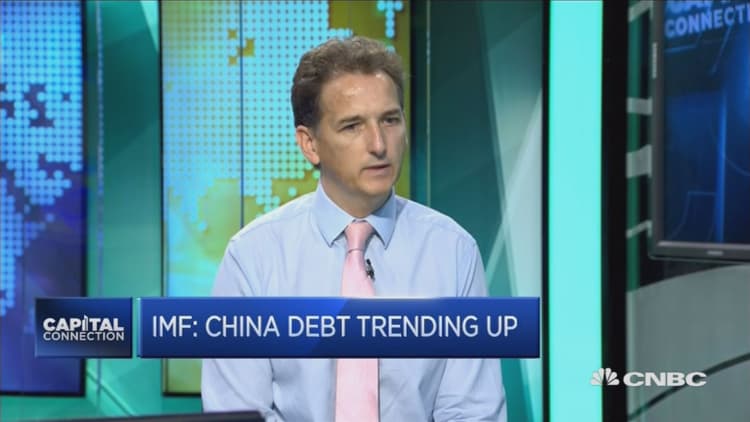
The Chinese government is moving to tackle high debt levels, but the country is still borrowing more, Deutsche Bank said in a report released Thursday.
That's because short-term consumer debt in China has begun to surge as authorities try to alleviate the high levels of corporate indebtedness. The redistribution comes as Beijing is trying to strike a balance between stability and strength in its economy.
Household debt in China is growing "very fast" and has accelerated in the last three to four months, according to Deutsche Bank: "If we focus purely on the consumer lending ... then China has been undergoing something akin to a consumer lending frenzy."
According to Deutsche Bank, corporate credit has fallen to 45 percent of net new credit, down from 65 percent in the last 10 years. Instead, Beijing is allowing households and governments to borrow more to fund growth, which is targeted for around 6.5 percent in 2017, said the analysts.
Now, short-term consumer credit is growing 35 percent year-over-year, and may hit about 40 percent year-over-year by the end of December at the current trend, Deutsche Bank said.
The bank said it isn't yet clear where exactly the short-term consumer credit is being deployed, although 70 to 80 percent of that debt has historically been credit card-related. Overall household credit growth in China, the analysts noted, is growing around 24 percent year-over-year.
At the end of the first half of 2017, corporate the debt-to-GDP ratio fell to 165 percent from the peak of 169 percent in the first quarter of 2016. That was "more of a 'stabilization' than a significant reduction," Deutsche Bank said, calling it an "explosion" of growth.
Meanwhile, household and government debt however rose by 8 to 9 percent of GDP.
"So when viewed in aggregate China is still leveraging up apace," the Deutsche Bank report concluded.
The note came just as the International Monetary Fund warned on Tuesday that China is on a "dangerous" credit-expansion path.
The main cost of stronger growth "is further large increases in public and private debt," the IMF said in its annual review of China's economy.
China, for its part, has said debt reduction efforts are showing results, but debt levels are still too high. New loans in July fell to the lowest level since November, Reuters reported on Tuesday.
At the National Financial Work Conference last month, China pledged to refresh its commitment to watching for financial risk.
China is set to hold its once-in-five years Communist Party Congress in the fall, during which a leadership reshuffle is expected. Analysts say the keyword in the lead-up to the event is "stability."
Recent reports from various sources say that's what's behind the Chinese efforts to cut risky debt.
The country is also cracking down on shadow banking, a broad category of banking-like services from non-traditional players, which is outside the bounds of normal banking regulation, so it largely goes unregulated.
Regulators are also pushing banks to rein in riskier corporate loans, including short-term credit, Reuters reported in June.

"At the absolute level, it's a concern. But at the margins, it's less of a concern," said Clive McDonnell, equity investment strategy head at Standard Chartered about Chinese debt.
Meanwhile, Deutsche Bank said the impact of consumer credit to the Chinese economy remains to be seen.
"China has never really had a 'consumer credit cycle' before so the question as to whether the banks can manage consumer credit risk effectively is likely to be tested at some stage in the next few years," the analysts wrote.

